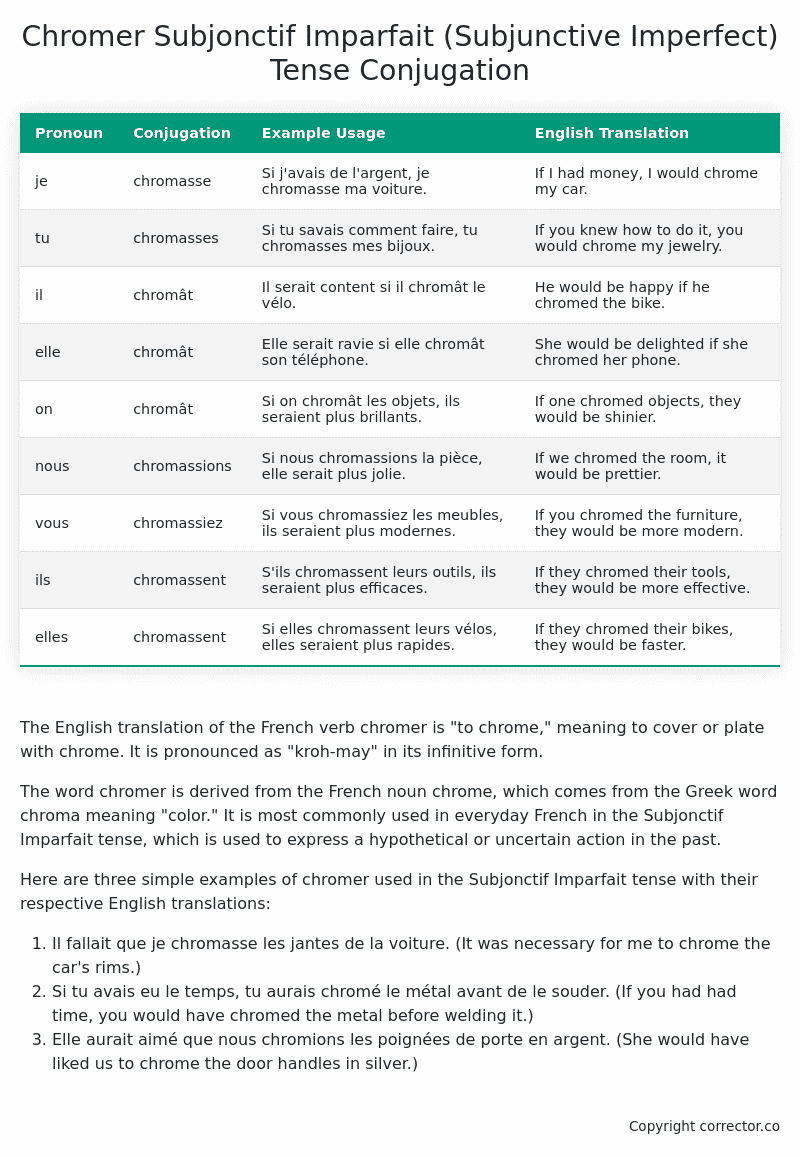Subjonctif Imparfait (Subjunctive Imperfect) Tense Conjugation of the French Verb chromer
Introduction to the verb chromer
The English translation of the French verb chromer is “to chrome,” meaning to cover or plate with chrome. It is pronounced as “kroh-may” in its infinitive form.
The word chromer is derived from the French noun chrome, which comes from the Greek word chroma meaning “color.” It is most commonly used in everyday French in the Subjonctif Imparfait tense, which is used to express a hypothetical or uncertain action in the past.
Here are three simple examples of chromer used in the Subjonctif Imparfait tense with their respective English translations:
- Il fallait que je chromasse les jantes de la voiture. (It was necessary for me to chrome the car’s rims.)
- Si tu avais eu le temps, tu aurais chromé le métal avant de le souder. (If you had had time, you would have chromed the metal before welding it.)
- Elle aurait aimé que nous chromions les poignées de porte en argent. (She would have liked us to chrome the door handles in silver.)
Table of the Subjonctif Imparfait (Subjunctive Imperfect) Tense Conjugation of chromer
| Pronoun | Conjugation | Example Usage | English Translation |
|---|---|---|---|
| je | chromasse | Si j’avais de l’argent, je chromasse ma voiture. | If I had money, I would chrome my car. |
| tu | chromasses | Si tu savais comment faire, tu chromasses mes bijoux. | If you knew how to do it, you would chrome my jewelry. |
| il | chromât | Il serait content si il chromât le vélo. | He would be happy if he chromed the bike. |
| elle | chromât | Elle serait ravie si elle chromât son téléphone. | She would be delighted if she chromed her phone. |
| on | chromât | Si on chromât les objets, ils seraient plus brillants. | If one chromed objects, they would be shinier. |
| nous | chromassions | Si nous chromassions la pièce, elle serait plus jolie. | If we chromed the room, it would be prettier. |
| vous | chromassiez | Si vous chromassiez les meubles, ils seraient plus modernes. | If you chromed the furniture, they would be more modern. |
| ils | chromassent | S’ils chromassent leurs outils, ils seraient plus efficaces. | If they chromed their tools, they would be more effective. |
| elles | chromassent | Si elles chromassent leurs vélos, elles seraient plus rapides. | If they chromed their bikes, they would be faster. |
Other Conjugations for Chromer.
Le Present (Present Tense) Conjugation of the French Verb chromer
Imparfait (Imperfect) Tense Conjugation of the French Verb chromer
Passé Simple (Simple Past) Tense Conjugation of the French Verb chromer
Passé Composé (Present Perfect) Tense Conjugation of the French Verb chromer
Futur Simple (Simple Future) Tense Conjugation of the French Verb chromer
Futur Proche (Near Future) Tense Conjugation of the French Verb chromer
Plus-que-parfait (Pluperfect) Tense Conjugation of the French Verb chromer
Passé Antérieur (Past Anterior) Tense Conjugation of the French Verb chromer
Futur Antérieur (Future Anterior) Tense Conjugation of the French Verb chromer
Subjonctif Présent (Subjunctive Present) Tense Conjugation of the French Verb chromer
Subjonctif Passé (Subjunctive Past) Tense Conjugation of the French Verb chromer
Subjonctif Imparfait (Subjunctive Imperfect) Tense Conjugation of the French Verb chromer (this article)
Subjonctif Plus-que-parfait (Subjunctive Pluperfect) Tense Conjugation of the French Verb chromer
Conditionnel Présent (Conditional Present) Tense Conjugation of the French Verb chromer
Conditionnel Passé (Conditional Past) Tense Conjugation of the French Verb chromer
L’impératif Présent (Imperative Present) Tense Conjugation of the French Verb chromer
L’infinitif Présent (Infinitive Present) Tense Conjugation of the French Verb chromer
Struggling with French verbs or the language in general? Why not use our free French Grammar Checker – no registration required!
Get a FREE Download Study Sheet of this Conjugation 🔥
Simply right click the image below, click “save image” and get your free reference for the chromer Subjonctif Imparfait tense conjugation!

Chromer – About the French Subjonctif Imparfait (Subjunctive Imperfect) Tense
Formation
Common Everyday Usage Patterns
Interactions with Other Tenses
Subjonctif Présent
Indicatif Passé Composé
Conditional
Conditional Perfect
Summary
I hope you enjoyed this article on the verb chromer. Still in a learning mood? Check out another TOTALLY random French verb conjugation!


